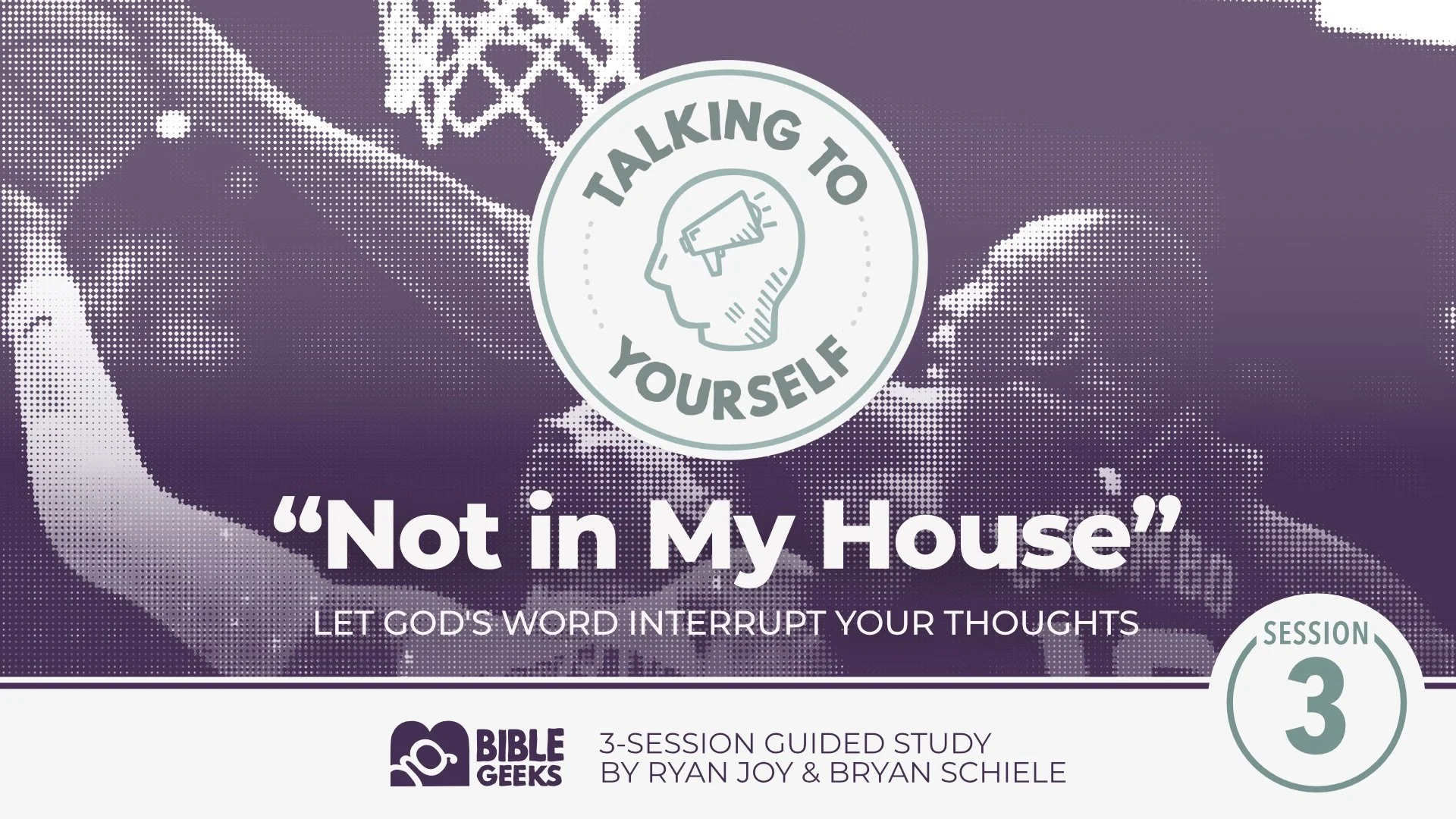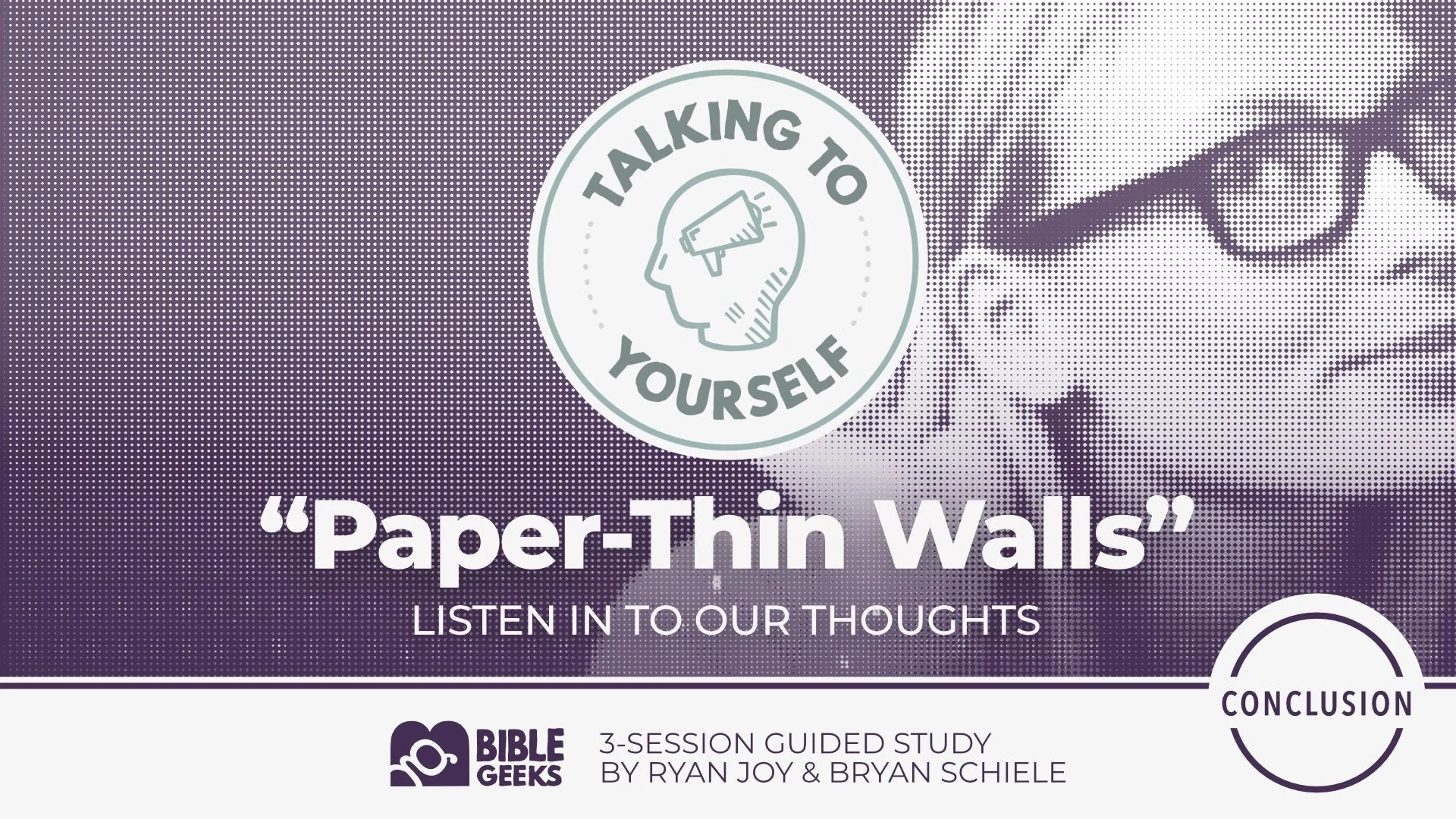
Prepare for Launch
get ready with these Helpful Resources
Luke 12:13-21; Ps. 19:7-14; James 4:14-16
“Not in My House”
It’s never a good day when a 7-foot tall gangly-armed center ruins your team’s playoff chances by intercepting a potential buzzer-beater shot with an epic “not in my house” block. Rather than scoring that game-winning goal, a team is left dejected as their ball goes sailing into the stands. But not all blocks are heartbreaking.
Scientists call our ongoing, inner dialogue "self-referential thought." Since it's constant, these typically negative and anxious patterns become ingrained. We get stuck in a conversation we can't seem to escape! And that’s where God comes in to knock our thoughts into a new direction, replacing them with his own.
The best thing that can happen to our inner dialogue is to bring God into the conversation.
THE BIG IDEA
Because what we tell ourselves isn’t always reliable, but what God tells us can save our eternal lives.
Jesus tells a parable about a man talking to himself. The man saw his farm’s excellent yield and “thought to himself, ‘What shall I do, for I have nowhere to store my crops?’” (Luke 12:17). He had a talk with ... himself, and together they planned their retirement!
He wanted what he wanted, and when he spoke to himself, it was about his favorite subject: himself! If you’re bold enough to look under the hood and examine your self-talk, prepare to learn some hard truths about what you value. Eavesdropping on yourself is not for the faint of heart!
But sometimes the best thing that can happen to our inner dialogue is for God to send the conversation in the opposite direction. “But God said to him, ‘Fool! This night your soul is required of you, and the things you have prepared, whose will they be?’“ (Luke 12:20).
God’s voice wants to break into your thoughts too, reminding you of a hard truth: you are mortal (James 4:14-16). So, whatever conversation you’re having with yourself right now, let the Lord interrupt your thoughts with his precious Word (Ps. 19:10, 14).
Are you clutching your treasures or investing your life in the lasting words of God?
THE BIG QUESTION

Hearing God
Let God's Word Interrupt Your Thoughts
INTRODUCTION
Launch the study with a CONVERSATION STARTER on the Big Idea.
Read or watch “Not in My House” (above). What do you take from that Big Idea and Big Question? ICE BREAKER — Get everyone engaged and talking.
What activity do you hate to be interrupted while doing?

ACT I
JESUS SAID — Matt. 5:22, 28, 32, 34, 39, 44
What is Jesus doing with the “But I say to you” statements?What themes do notice throughout these statements?What insights and applications do you take from these words of Christ? What do we need to get from these words that — if understood and applied — has the power to change a life or a family?Is there anything else here you find helpful or interesting? Anything you’ve never noticed before — or have always loved about these words?

ACT II
Here’s the Story — The Rich Fool (Luke 12:13-21)
In your own words, summarize each section of the story identified below.
In group studies, take turns summarizing the sections until the group has told the whole story. Then discuss your answers to the questions at the bottom.Intro – Luke 12:13-15
Story Part 1 — Luke 12:16-18
Story Part 2 — Luke 12:19-20
Conclusion – Luke 12:21
What’s the main point of this passage? What key truths should we take away from the story?
ACT III
REACH OUT — Connect with each other with this question.
Share a time you've had a "you are the man" (2 Sam. 12:7-9) moment of conviction.
WRAP UP
THE CHALLENGE — Ready to put it into practice?
Write a helpful memory verse on a slip of paper and repeat it to yourself throughout the week.REQUEST — Go to God in a closing prayer.
For example: "Help me to know the truth" (cf. John 8:32).Traveling with my family or for work, I’ve had to stay in plenty of hotels over the years. Some accommodations are almost palatial, while others earn their “roach motel” status. But the most important aspect of a quality room to me — besides the cleanliness — are the thickness and soundproofing of the walls. Nothing ruins a good night’s sleep more than listening to your next-door neighbors blasting cable news, arguing on the phone, or banging their “Herman Munster” shoes all across the room through paper-thin walls!
“Paper-Thin Walls”
Conclusion
But what if your thoughts were to take up residence next door? Could you make them out clearly or would you have to press your ear to the wall to listen in to their muffled mumbling? Most of us don’t give a second thought to ... our thoughts. Listening in on our inner dialogue can be unnerving, revealing a side of ourselves we might not appreciate. But throughout these studies, we’ve seen how important it is to think seriously about our thinking, carefully navigating the stories we tell ourselves.
We’ve learned lessons from the inner dialogue of a rich fool (Luke 12:16-21), a poor son who hit rock bottom (Luke 15:17-19), and a psalmist drowning in despair (Psalm 42:11; 43:5). We’ve seen the need to be honest with ourselves, to turn our hearts towards God, letting him take control of our inner-self. And we’ve asked ourselves some challenging questions, probing the inner-depths of our hearts.
So, as we wrap up these conversations, let's look back at the big ideas we've tackled along the way.
THE BIG IDEAS FROM THIS STUDY
What we tell ourselves can impact us in ways we don’t even realize.
We get to choose which inner voice we obey.
God can calm our fears, anxieties, and crippling uncertainties.
The best thing that can happen to our inner dialogue is to bring God into the conversation.
A CLOSING QUESTION
How has this study changed how you talk to yourself?


